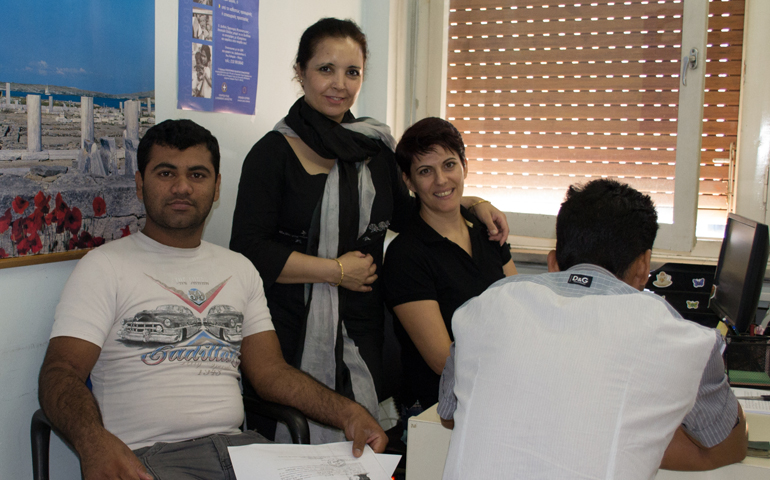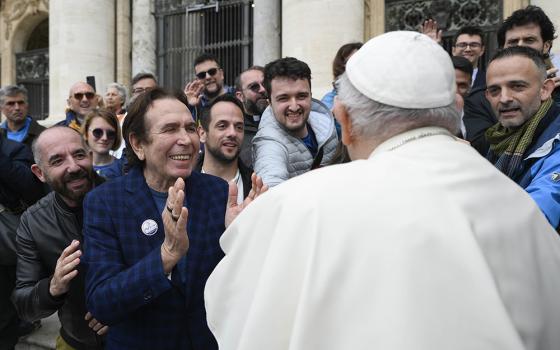
Panayiota Agolli (second from right), researcher and field coordinator at the Greek Council for Refugees, interviews a refugee in 2015 in her Athens office. Agolli is collecting data on migrants in Greece for the EVI-MED project, a research initiative lead by Middlesex University in London. (Courtesy Greek Refugee Council)
Editor's note: Bertelsen intern Traci Badalucco traveled to Italy to research the migrant crisis in the country. Look for additional reporting from Badalucco on NCRonline.org.
Asylum seekers to Europe in 2015 reached a record 1.3 million, the greatest influx to the continent since 1985 and the largest in almost 25 years, according to a Pew Research Center report released Aug. 2.
Greece has borne the brunt of the influx as the main entry point to Europe, with a total of 850,000 arrivals in 2015, according to the report. And between January and June this year, 162,563 migrants entered Greece illegally by the Eastern Mediterranean route, according to Frontex, a European border agency based in Warsaw, Poland. The majority -- from Syria, Afghanistan and Iraq -- arrived on the Greek island of Lesbos, according to the site.
Around 885,000 migrants arrived in Europe in 2015 by the Eastern Mediterranean -- 17 times the number in 2014, also a record year with 50,830 migrants, according to Frontex.
European countries like Greece have scrambled to meet the demand of asylum and housing requests of newly arrived migrants, creating a divide among EU member states on how to address the crisis. In the Pew survey, 94 percent of Greeks said they disapproved with its country's handling of refugees.
Panayiota Agolli, researcher and field coordinator at the Greek Council for Refugees, is collecting data on migrants in Greece for the EVI-MED project, a research initiative led by Middlesex University in London. Agolli travelled to Palermo, Sicily, last month for a day of dialogue hosted by the University of Palermo. The conference highlighted some of the team's findings.
Agolli, 42, along with Borderline Sicily in Italy and the People for Change Foundation in Malta, are collecting data in the field in their respective countries for the study. She sat down with NCR to discuss her findings. The interview has been edited for length and clarity.
NCR: Why are you here today?
Agolli: During May and June we had an operation with Middlesex University in London. I am working for the Greek Council for Refugees and it was a cooperation to find out in the field and on the ground information and data about all the newcomers [including] ages, genders, professions, countries they are coming [from], and [whether] they are families or singles. To see what their [goal] is in Europe and whether it is to stay in Greece or in Italy or to look for somewhere else. We had to find out how much money they had to pay for the trip and how they organized the trip and who helped them. We also had to find out about the legal status they had. Have they been under the status of asylum seekers, are they irregular migrants or refugees. What is the status of all these people during 2015 and 2016 in Greece and in Italy.
Why did they concentrate on Greece, Italy and Malta?
Because the problem is huge in these countries. The entry points of refugees and migrants coming illegally to Europe are in Malta, Italy and Greece.
People from around the world read about the migrant crisis in the news nearly every day. How is it different when you live there?
The first thing is you are shocked watching all these people sleeping on the streets. In Greece, we [are trying] to find places where they can live and they can settle. But before this, it was a terrible situation for these people. It's not easy to see pregnant women, to see kids and families sleeping on the streets with no food, no money, no water. And you could see Greek people going around offering food, clothes, and milk for all these small kids. [It lasted] about six months like this and then we tried to organize because new arrivals were coming again.
Is there no security at the border?
There are borders in Evros which is the point they enter by walking. But watching all these people coming from war ... no one can stop them. It's really touching to see all the Greek people who live on the islands go into the sea to help these people coming [by boat].
In your experience, have the Greeks always been this welcoming? Because there are many groups in Europe now that don't want any more refugees to come.
Generally speaking, I can say that in Greece they are very welcoming. But there are some independent opinions and they don't want them to enter. There are always such voices. But the most impressive thing I found out from the research is the way they were accommodated after entering Greece. There are shelters offered by churches even though they are not Christians or Orthodox. They are Muslims mostly. And the most interesting thing is many of them are hosted in Greek families. That's really touching. So I forget every independent voice of not wanting them to come and I keep in mind all these Greek families helping them by opening the doors to their houses. It's really hard to open the door of your house to some stranger. But they did it.
What do you say to Islamophobia, or to those who associate Muslim refugees with terrorism?
It's just a religion. It's like [us] believing in a different religion. It's peaceful. When they arrive and they are speaking with people, the first thing they say to you is, 'As-Salaam-Alaikum,' which means 'peace be unto you.' Can you imagine? We don't say 'peace be unto you.' So what can you imagine about these people? They are terrorists?
What has your research shown so far? Do they want to stay in Greece or do they want to go to wealthier European countries in the north?
Most of them just want a transit. They came to Greece because it was easy to come but after this they want to reach Europe -- central and northern Europe. They have some countries in mind when they come. Maybe they have some family members and they want to go. The countries that are mostly wanted are Germany, Switzerland, France, Luxembourg, Austria, Sweden and Finland.
Why do they want to go to those countries?
They have heard many good things about the social system they have. With camps for refugees and with offered places to live like houses. But they don't realize the mentality of those countries. They will never find [a place] like Greece. That's my opinion. Greece has no possibility to offer accommodation for free for their whole life or [500 euros] for each kid [like in other countries]. But in Greece they can do more things because I think in Greece the humanity is extremely large. You have neighbors who bring you food, clothes every day, or anything else you might need. It doesn't happen in Europe very easily. That's the truth I think.
Are you expecting more migrants during the summer months?
On Feb. 20, the border was closed in Macedonia. After this the number of newcomers was reduced. They stopped coming to Greece. And after March 20 the number went down even more. It happened because of the agreement between Greece and Turkey. So they decided to give priority of the relocation program to people [who] are still in Turkey. Newcomers will be coming but not [like] it was before.
Even though the crisis is still just as bad in Syria and the Middle East.
I consider all these people victims. And they are victims of the smugglers. The smugglers are people who make a lot of money by just selling this idea. 'You go to Europe and you will have 500 euros per month for each one in your family so go this way.' But since the borders are closed all this smuggler marketing has been stuck and closed I think. It doesn't work anymore.
Where are the smugglers and how much do they make?
They are in Turkey, in Syria, in Iran, in Greece. They are everywhere. I can say it depends on the country you are [coming from]. When you come from Pakistan they are paying more than 7,000 euros per person.
So they are paying for trust with no guarantee.
Yes. They pay half of the amount at the starting point and the rest of the money in Greece to someone else. For countries like Iran they pay 4,000 euros per person. If they arrive in Turkey from Syria by plane -- because it happens ... many of them just fly from Syria to Turkey with a simple ticket -- then from Turkey to Greece, the amount is just 500 euros per person.
Do you see a lot of refugees who were professionals in their countries?
I have seen doctors at my office begging for help. I have seen journalists, lawyers. I have met people with Ph.D.s and professors. You would see them on the streets and you could say, “Oh, what a poor situation,” but no, they have degrees and titles. It's not just poor people coming. After a trip of many, many days going through Turkey where no one respects you and coming to Greece by boat, you forget everything. Your dignity, your personality, who you are, everything. You just want to survive.
The majority of these people from my statistics were people with university degrees and with upper secondary degrees with professions and occupations. Really respected. I can say 80 percent of them were like this. Because they have the money to pay for the trip. The other ones are still somewhere lost in Middle East.
What is the purpose of this research?
It's to see what happens with all these people. To see the legal documentation process, how much time they need to be documented, will they be accepted or rejected. And we are not talking only about Syrians. They have a privilege because of the war. But we also have people from Afghanistan. No one mentions them. They are coming from a country where ISIS has the power.
And Iraq, too. Iran. There is no war in Iran but they have different problems. They have problems with the state because of the fact that it's an Islamic state and they support ISIS. The simple people consider that Iraq supports ISIS. So all these people don't want to live in such a country. The first thing they do after arriving in Greece is change their religion. And they claim asylum on the grounds of changing the religion. And [they say] if they go back to Iran after they have become Christians they will be killed. This is what they claim. And maybe it could be happen, I don't know. Many of them claim that it happens in Iran.
Do they actually change their religion or do they just say they do?
No. They have been baptized. Every one of them has baptismal documents.
But it's not required.
It's not required. They claim asylum but most of the cases have been rejected. I've started to see people being rejected claiming asylum on these grounds from Iran. There are some cases that have been accepted but it's really hard to prove that they were victims of torture. They have to show in different ways why they are considered victims of torture.
Have you thought about what a solution might be to address the crisis?
I have an idea because I have seen what has happened in past years. If they are from Syria, OK, I consider them lucky ones because you have asylum protection. Also if they are from Iraq they have this asylum protection. But all the others will struggle. They will be living in ghettos with no help. Maybe some of them will be traveling to Europe illegally, because there is always a way. You can see that they sell fake passports on the streets of Athens for very high amounts. But after many, many years ... let's say five, six, seven, they will return back to the Middle East. It's like recycling the story. We have seen such cases during the previous years -- people arriving illegally the same way. Not so massively, but they arrived by boat from Turkey to Greece 10 years ago. They did the same thing: seeking asylum, waiting for asylum, having the asylum rejected, appealing the asylum rejection, and after seven years of working illegally with no chance to be citizens they decide to return. It will be the same thing I think with the new arrivals.
After experiencing the realities of Europe and of Greece, and the asylum process, do many say they wish they had stayed home and risked the unknown?
Yeah. Many of them have regretted [coming]. And they have said, “We could [have] stayed on the borders of Syria somewhere in a refugee camp and waited.” Many of them say this.
Is there anything else you'd like to add?
For me personally it was a very precious experience to be in the field with these people because when you are in an office you don't see what's happening outside. When you are with them in the field you see that all these people are human beings. They are not bad people. They arrive here to take their chances. They are human beings of this earth and they just need a hand to walk next to them. And I can say that we have a responsibility to offer this help to them.
When you say we have a responsibility, do you mean Greeks, Europeans?
Everyone. Not only Greeks. Everyone in the world. Especially everyone in Europe, though, since they are approaching Europe. I think we have the possibility. We can. Why not?
[Traci Badalucco is an NCR Bertelsen intern. Her email address is tbadalucco@ncronline.org.]




